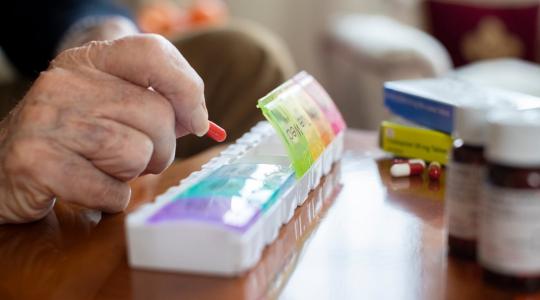As the emphasis in the healthcare industry continues its shift toward preventive care and quality improvement (QI), the training of health professionals is also shifting and adapting. Southwestern Health Resources (SWHR) is working in conjunction with UT Southwestern's School of Health Professions to train physician assistant (PA) students in quality improvement initiatives through the Embedding Quality Improvement Into Practice (EQUIP) program.
The program was the brainchild of Temple Howell-Stampley, MD, Department Chair and Program Director in Physician Assistant Studies at UT Southwestern.
"I wanted to enhance our work with students and faculty in quality improvement and patient safety," she said. There was already a program at UT Southwestern for medical students to study quality improvement practices, and she wanted physician assistant students to have a similar opportunity.
She turned to Jason Fish, MD, Chief Medical Officer for SWHR, for help developing a program that would allow physician assistant students and faculty to learn about quality improvement initiatives.
"This was a natural fit," Fish said. "QI is part of our mission to provide the highest standard of care to patients while also improving efficiency and reducing costs. We can share our expertise with students so they're prepared to bring that knowledge with them as they enter practice."
Venetia Orcutt, PhD, Associate Professor in Physician Assistant Studies and EQUIP Program Director, said, "Our relationship with SWHR is truly a gift to this department. The commitment shown from all levels has been incredible."
From monthly planning meetings, to pairing students with participating clinical practices, to the high level of lectures provided throughout the curriculum, the program has provided an invaluable experience to the students, Orcutt added.
In the program, participating PA students spend four weeks in morning lectures with QI experts, then in the afternoons they implement what they've learned in a clinical setting. During this time, they create a project based on QI and begin to implement it, continuing the project into the eight-week clinical rotation that's part of their PA program.
Student projects have included incorporating digital screening for retinopathy into clinic visits; including point-of-care hemoglobin A1c testing as part of clinic visits; and training medical assistants to take blood pressure measurements following specific guidelines for more accurate results. The students participating in the program use this project for their final graduate manuscript that's required as part of the PA program.
"Quality improvement is how we improve the way we practice," said Bethany Grubb, Assistant Professor of Physician Assistant Studies, who works with the program. "We optimize to meet the needs of patients and improve the efficiency of clinics. We use QI tools to enhance follow-up and care of patients, in the short and long term. Ultimately, it's all about the patients."
Boone Bacon was one of the students in the most recent cohort to complete the program. He decided to participate because he felt that it would be an important opportunity to learn about the processes that drive improvement within healthcare. "As a provider, our goal is to deliver the best care possible to our patients, and the EQUIP program gives you the tools necessary to help reach that goal," he said.
Bacon's project focused on improving the process of conducting digital retinal imaging during clinic visits for patients with diabetes. This included analyzing the clinic workflow, from initial contact with the patient during appointment scheduling through the procedures during the visit, as well as training of clinic staff to use the available equipment.
"The most valuable thing I took away from the experience was a different perspective on the way operations flow in a workplace from a team-based perspective," he said. "Many processes involve multiple moving parts and individuals, and for optimization to be achieved it requires cooperation and communication from everyone involved."
This training has already proved valuable for Bacon in his career. "In my current role, this is more important than ever as the timing of patients' treatment is often crucial and relies on the participation of multiple different specialists," he said.
In June, Bacon joined UT Southwestern's William P. Clements Jr. University Hospital as an Internal Medicine Hospitalist.
"Unfortunately, through evaluation of quality measures in hospital settings, we know that patients sometimes experience negative healthcare outcomes due to system-related shortcomings," he added. "Going forward, I hope to be able to use the quality improvement principles taught by the EQUIP program to help avoid these instances as often as possible."
The program is entering its third year. For the first two years, three students participated in each cohort. This upcoming year, six students will be involved in the program. "We hope to keep expanding it," Grubb said, "but not beyond our ability to support it. It requires a lot of interaction."
The students who participate in the EQUIP program are selected in a random drawing from among those who've expressed interest as part of the "draft day" in which students are assigned their clinical rotations.
Orcutt said the program's goal over the next few years is to increase the number of students in this intensive curriculum from the pilot number of 5% to 20% of enrolled students during the clinical phase of the curriculum. The program also plans to develop a "Distinction in Quality Improvement" to be awarded to those students at graduation.
Faculty members are pleased with the program results so far. "It's been fantastic," said Howell-Stampley. "Dr. Fish and his team have been so instrumental in helping us implement this program and supporting it, continuing to be there for it."



